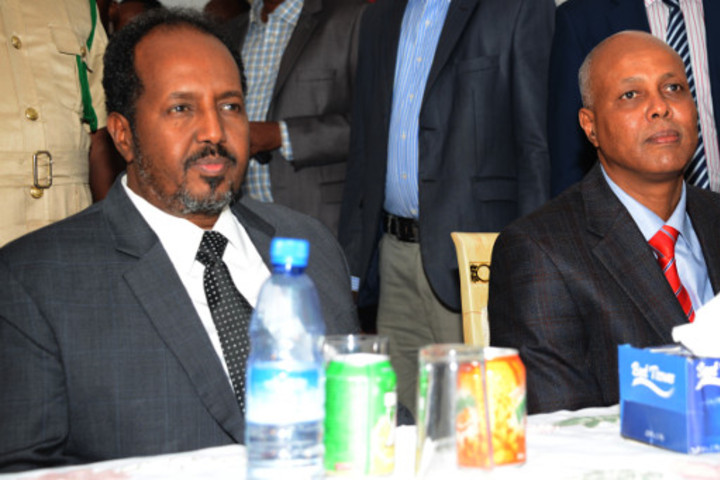
Monday, December 23, 2013
By Osman Mohamud

Somalia's new Prime Minister Abdiweli Sheikh Ahmed (right) sits next to President Hassan Sheikh Mohamud on December 12th in Mogadishu. [Mohamed Abdiwahab/AFP]
Somalis have voiced mixed reaction to newly-confirmed Prime Minister Abdiweli Sheikh Ahmed, with some saying his economic experience will improve the country's development while others are concerned about his lack of national security experience.
Ahmed's appointment was confirmed by parliament Saturday (December 21st) by a vote of approval from 243 of 246 lawmakers, with three abstaining from the vote.
"I am very grateful with parliament for endorsing my nomination," Ahmed said after the vote, according to AFP. "I promise to work for the development of the country and to form a cabinet of high quality soon."
The new prime minister has 30 days to appoint his cabinet, which must then be approved by parliament.
Ahmed, 54, is a dual Somali-Canadian citizen and holds a doctorate in trade and development from Ottawa University.
He replaces Abdi Farah Shirdon who was ousted by parliament December 2nd, after just over a year in the post and a power struggle with President Hassan Sheikh Mohamud.
Ahmed comes from the same clan as Shirdon, which is likely to appease supporters of the former prime minister.
Seamless transition of power
After his nomination December 12th, Ahmed said he would focus on reconciliation, completing the provisional constitution, reviving government institutions and improving security throughout the country.
Abdullahi Hassan Shirwa, director of Mogadishu-based non-governmental organisation Somali Peace Line, said dealing with security will be Ahmed's most challenging task ahead.
"The new prime minister should improve the security situation and that is how he can entice the public to co-operate with the government," he told Sabahi. "The new administration will need public support, and if it does not get it, it will fall apart and infighting will begin."
"Also, all government agencies need to provide opportunities for public feedback and financial contributions," he said.
Shirwa suggested that Ahmed not change the entire cabinet, but rather he should focus on making sure that the ongoing work by key ministries continues without a hitch during the transition.
He praised Shirdon's administration for improving foreign relations, but said Somalia's internal affairs had not been addressed in a similar manner.
"In the area of international relations, [Shirdon's] administration did a lot of work. It re-established foreign relations and entered into critical agreements with various organisations," he said. "Some work was done on security and the judiciary, but [progress on those fronts] was not sufficient."
The new prime minister will be able to effectively address the monumental tasks at hand if he seeks advice from all sectors of the society, Shirwa said.
Challenges ahead: insecurity, youth unemployment
Somali Congress of Trade Unions Chairman Mohamed Osman Haji agreed that the new prime minister should work with members of the previous cabinet who have done tangible work so that progress is not hampered.
"I believe that is more valuable to keep a minister who has been doing the job [well] rather than appointing a new one, and to change the minister who has been ineffective," he told Sabahi.
Haji said another challenge the new administration faces is finding a solution for youth unemployment, which goes hand-in-hand with insecurity.
"Seventy-five percent of the youth are unemployed," he said. "It is important for the new administration that will be created by the new prime minister to do something about this issue so that young people can distance themselves from issues that can harm security."
Meanwhile, Asha Abdullahi Isse, who served as deputy minister of women's affairs under former Transitional Federal Government President Abdullahi Yusuf Ahmed, said the new prime minister should take the opportunity to create a more inclusive cabinet by appointing more women to ministerial posts.
"Everyone knows the effectiveness of the two female ministers -- Minister of Development and Social Affairs Maryan Qasim [Ahmed] and the Minister of Foreign Affairs Fowsiyo Yusuf Haji [Aadan] -- during the administration of Abdi Farah Shirdon," she told Sabahi.
"If [the number] of women ministers is increased, I believe the administration will benefit from their participation," she said.
Special interests at work?
Yet Qadra Abdi, a 35-year-old who studied sociology at University of Somalia, expressed doubt that any progress or change will be realised due to political cronyism.
"I am thankful to the prime minister for filling the vacant post, but I do not think that he will bring any special progress," she told Sabahi. "Each time a new person is appointed, they make it seem to us as though the country's progress is in the hands of that one individual. However, the reality is that politics does not have a special friend, but has special interests."
Unless the new prime minister is able to effectively manage special interest groups and negotiate with the various stakeholders in Somalia's political landscape, she said, he will eventually succumb to the cycle of political infighting.
For his part, Ahmed said he was wrapping up consultations with local elders, politicians and citizens on the types of ministers he will need.
"My cabinet will be larger than the previous cabinet," Ahmed told Voice of America Somali Service on Sunday. He said his focus would be on creating a capable security force able to restore the public's confidence.